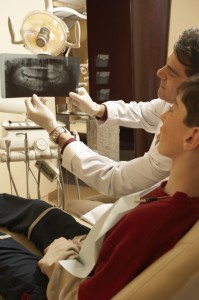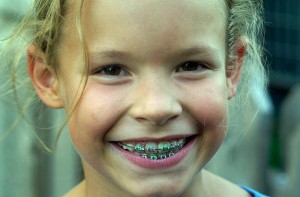June 18th, 2013

For many of our patients at Nelson Family Dentistry, summer means a season of relaxation, vacation, outdoor fun and activities. While you can’t take a vacation from dental emergencies, you can always be prepared for anything that could happen. Today, our team thought we would give our patients a few tips on handling a dental emergency when you’re far from home (and our office).
Throbbing Toothache – Try brushing and flossing to ease the pain; the issue could be simply that a piece of food is nestled in an uncomfortable spot between your teeth. If that is the case, try to gently remove the object with dental floss. If it still hurts, stick to soft foods, try an over-the-counter pain reliever, or dip a cotton ball in clove oil and insert it on the affected area until you can get to a local dentist.
Bitten Lip or Tongue – Clean the area gently with a cloth and apply cold compresses to reduce swelling. If the bleeding doesn’t stop, go to a hospital emergency room immediately.
Lost Filling or Crown – Dental wax will work to keep the sharp edges of your tooth from bothering you. If you can, save the crown or filling, and if you happen to have denture adhesive handy, you can use it to temporarily reattach the crown until you can get to a local dentist.
Broken Tooth – Hold the tooth by the crown and rinse off the root of the tooth in water if it’s dirty. If possible, gently insert and hold the tooth in its socket. If that isn’t possible, put the tooth in a cup of milk and get to a local dentist as quickly as possible.
Broken Jaw – Apply cold compresses to control swelling. Visit a hospital emergency room as soon as possible.
If you have a dental emergency after regular office hours and you happen to be in town, please give us a call. If you are calling us after hours, please follow the emergency prompts.

May 16th, 2013
 The American Academy of Pediatric Dentists, The American Academy of Pediatrics and The American Dental Association all agree that your child’s first dental visit should be scheduled in the time period between the appearance of your child’s first tooth and his or her first birthday. Just like with medical care, your child should be seen this early to prevent the kind of problems we see quite often in young children. The fact is, your infant or child’s teeth are affected by many factors, including feeding habits, pacifiers, thumb habits, gum-cleansing and fluoride levels in the mouth. Unfortunately, we continue to see many dental problems in children under age two that are caused by improper feeding and brushing habits. By having a pediatric dentist see children by age one, parents can be armed with information that can prevent many of these early dental problems. Pediatric dentists or dentists who limit their practice to children have the special skills required to work with infants and young children, as well as extensive training in the most up to date and thorough treatment for a wide variety of children’s dental problems.
The American Academy of Pediatric Dentists, The American Academy of Pediatrics and The American Dental Association all agree that your child’s first dental visit should be scheduled in the time period between the appearance of your child’s first tooth and his or her first birthday. Just like with medical care, your child should be seen this early to prevent the kind of problems we see quite often in young children. The fact is, your infant or child’s teeth are affected by many factors, including feeding habits, pacifiers, thumb habits, gum-cleansing and fluoride levels in the mouth. Unfortunately, we continue to see many dental problems in children under age two that are caused by improper feeding and brushing habits. By having a pediatric dentist see children by age one, parents can be armed with information that can prevent many of these early dental problems. Pediatric dentists or dentists who limit their practice to children have the special skills required to work with infants and young children, as well as extensive training in the most up to date and thorough treatment for a wide variety of children’s dental problems.
Here is what happens during a typical child’s first dental visit:
• While lying in the parents lap, the dentist will examine the child’s teeth, jaws and oral tissues and demonstrate proper brushing procedures.
• Parents will learn how to position the child for a thorough oral cleaning.
• The dentist will look for potential oral problems and overall growth and development of the mouth and jaws.
• The dentist will carefully review the child’s medical history and discuss preventive measures for dental disease.
• The dentist will educate the parent about the role of diet in dental health.
• The dentist will evaluate fluoride needs and prescribe supplements if needed.
After the examination, the parent and dentist can address other concerns, such as teething, nursing bottles, pacifiers and thumb sucking…all to ensure your child gets a great start to a lifetime of clean, cavity free teeth and oral health.
Getting kids off to a safe, secure and positive start with a pediatric dentist helps them become accustomed to the dental office environment, dental assistants, staff and dentist themselves, so they will develop a positive, healthy and proactive attitude toward dental care from an early age.
If you have any pediatric dental questions you would like answered, please reach out to us on Facebook!
May 9th, 2013
 Unfortunately, many diseases of the teeth and surrounding oral tissues cannot be seen by a visual oral exam. An x-ray examination may reveal problems like: areas of decay between the teeth or below existing fillings, infections in the bone, gum disease, extra or congenitally missing permanent teeth, other developmental abnormalities, cysts or tumors in the jaw bone.
Unfortunately, many diseases of the teeth and surrounding oral tissues cannot be seen by a visual oral exam. An x-ray examination may reveal problems like: areas of decay between the teeth or below existing fillings, infections in the bone, gum disease, extra or congenitally missing permanent teeth, other developmental abnormalities, cysts or tumors in the jaw bone.
Finding and treating dental problems at an early stage can save time, money and unnecessary discomfort. Sometimes very small areas of decay can be stopped or reversed with topical fluoride or other preventive substances. How often x-rays should be taken depends on the patients individual health needs, one being the patient's potential risk for decay. In general, children need x-rays more often than adults. This is because their mouths grow and change rapidly and they are more susceptible to tooth decay than adults. The American Academy of Pediatric Dentistry recommends x-ray exams every six months for children with a high-risk of tooth decay. Children with a lower risk of tooth decay require x-rays less frequently.
The safety of x-rays has increased significantly in recent years. With advances in film speed, reduced size of the x-ray beam and getter filters, the amount of radiation is extremely small. In fact, dental x-rays represent a far smaller risk than an undetected and untreated dental problem. In addition, all patients are further protected with lead body and thyroid shields during x-ray examinations. Radiation exposure from dental x-rays 1 to 2 times a year is much less than radiation exposure from natural sources like the sun.
April 19th, 2013

Thank goodness times have dramatically changed in the delivery of children’s dentistry. The specialty of pediatric dentistry has seen a huge growth in the last 15 years. These dentists are specially trained to be aware of and manage the unique feelings and fears of a developing child. The fact that dentists chose this specialty also means they enjoy and are comfortable working with children. In turn, these specialists hire staff that also enjoy working with children.
In spite of these changes, it is easy to pass on fears to your child if you are not careful. First, never talk about dentistry in negative or scary terms in front of your child. Don’t say things like, they are going to give you a shot or its only going to hurt for a little while or they are going to drill your teeth. A young child’s imagination can create all types of unrealistic thoughts and images.
The best way to avoid dental fear is to start dental visits by age one and find a dentist who specializes in children. This way the child starts off with easy preventive oriented visits and gives them time to become comfortable with the dental team. During these visits the dentist and staff will give you more advice and tips on how to raise your child with a comfortable and healthy attitude towards dental care.
Please don’t wait until your child has a problem before taking them to the dentist. Starting off with difficult or emergency care often will leave a child with lasting negative impressions.


 Patient Login
Patient Login




 Back to top
Back to top Website Powered by Sesame 24-7™
Website Powered by Sesame 24-7™